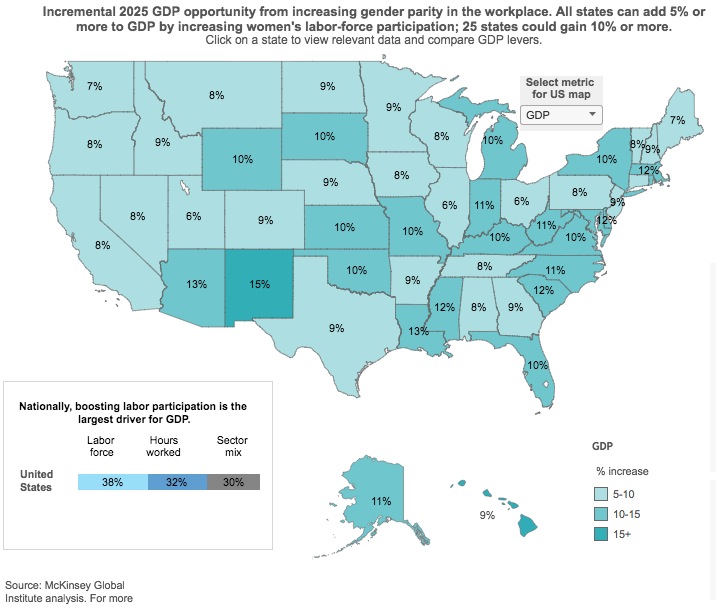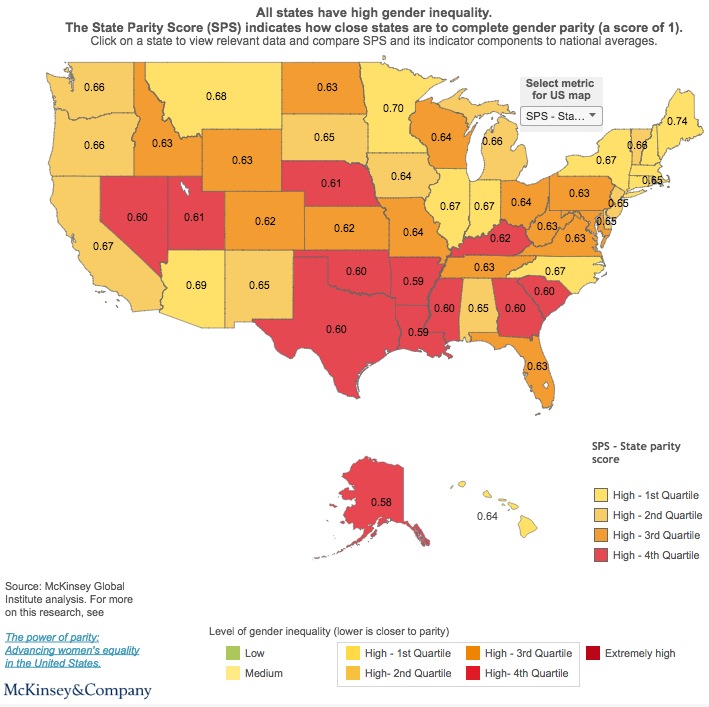Governing points toward a report by McKinsey & Company that says achieving full gender equality in the U.S. could add $4.3 trillion to U.S. GDP. In South Dakota, full gender equality would boost our economy 10%:
McKinsey finds every state has a long way to go toward gender equality, but South Dakota is in the middle of the national pack on McKinsey’s State Parity Score:
McKinsey explains six areas out of ten where the U.S. should focus its efforts to put women on equal par with men economically and socially:
Worldwide, enhancing women’s economic potential has gone hand in hand with achieving greater social gender equality. Based on the relationship between capturing economic opportunity and tackling societal barriers to women’s economic participation, MGI has taken a broad view of gender inequality in the United States using ten indicators of gender equality in work and society. US gender inequality is low or medium on four: labor-force participation rate, professional and technical jobs, higher education, and maternal mortality. Inequality is high or extremely high on six: leadership and managerial positions, unpaid care work, single mothers, teenage pregnancy, political representation, and violence against women. These six should be prioritized as “impact zones” for action. To give an idea of the considerable challenges that the United States faces, there are just 66 women for every 100 men in business leadership and managerial positions, women do almost double the unpaid care work that men do, and there is one incident of sexual violence for every two women in the United States [Kweilin Ellingrud et al., “The Power of Parity: Advancing Women’s Equality in the United States,” McKinsey & Company, April 2016].
One of the routes to gender equality involves no government action at all. All we need is for us guys to watch less football:
The best-in-class scenario assumes that the hours that women work increase from 89 percent to 95 percent of those worked by men, adding, on average, 35 minutes per day, based on an average ten-hour workday. This increase in hours worked by women could be achieved by men allocating more of their leisure time to helping out around the house. Men, on average, spend one hour more each day on leisure activities than women do [Ellingrud et al., April 2016].
If we are to realize Rep. Paula Hawks’s ideal of equal pay for equal work, we need to give women time to do that equal work. We means us, fellas. Turn off the tube, and scrub those dishes!


So if women work more hours, then the higher labor supply means wages will go down. The impact on GDP is zero, but the liberal corporate capitalists make more profits with cheaper labor. Is that what you want Cory?
Cory, who is going to do the dishes in the 40% of homes who have single moms?
Collective bargaining and union membership would go a long way to payment equity goals (both gender and racial). The best answer is in advocating for yourself and not relying on leaders/higher ups to “fix” the social inequality for you.
The meme that women only make 70% of men is inaccurate at best, a blatant lie at worse. If it were true, no man would have a job, since women work cheaper. And businesses would only hire women.
Equal pay is a big issue in professional tennis right now. Women want equal pay for obvious reasons.
In the grand slam tennis tournaments (Australian Open, Roland Garros, Wimbledon, US Open) women receive equal pay. But they don’t do equal work. Men play best of 5 set matches while women only play best of 3 set matches.
Should women receive equal pay for less work?
In lesser tournaments where both men and women play, women may or may not receive equal pay. In these tournaments both men and women play best of 3 set matches – so equal work. Generally but not always, men’s matches draw more spectators and more revenue than women’s matches.
Should women receive equal pay for equal work when the revenue their work generates is less?
Discuss
Rorschach,
Socialists don’t care about who works more and/or who works more efficiently. We all get the same (equal) reward at the end of the day.
Rorschach,
Capitalists don’t care about who works more and/or who works more efficiently. We all get what is left after they take their profit at the end of the day.
Your statement sounds a lot like the Prodigal Son parable, Mr. Sibson. Was Jesus wrong in his message?
If it were true, no man would have a job, since women work cheaper. And businesses would only hire women.
Migrant workers-both men and women-would work cheaper than American women so businesses would only hire Migrants. Ain’t that a kick in the pants, Good Sense?
Rorschach, parables that Jesus taught were not meant for unbelievers. In context the one you mentioned has nothing to do with my comment.
http://thinkprogress.org/immigration/2013/04/08/1834451/setting-the-record-straight-on-farm-worker-pay/
Oh dear, it would appear that Rorschach is correct, the Prodigal Son’s father was a socialist (in the way he treated his two sons) in the very nature Steve described socialism.
Thank you Cory! This is a point I’ve been stressing for some time.
Switzerland is thinking about paying residents $26,000 a month, no questions asked, or work performed. apparently.
Send Sibson to Switzerland.
Let’s try it this way-pay men and women equally from day one and then, on a case by case basis, decide if one or the other should receive more for work performed. Maybe one of the two has more responsibilities and thus should be paid more.
As the McKinsey article explains (and as I higlighted above), the issue of full gender equality goes far beyond simply paying men and women equal wages. It means making serious strides to giving women equal opportunities to go earn and keep those wages, without being subjected to sexism and violence.
Switzerland is considering $2,600 per month if I heard correctly. Just checked.
“A grassroots committee is calling for all adults in Switzerland to receive an unconditional income of 2,500 Swiss francs ($2,800) per month from the state, with the aim of providing a financial safety net for the population.”
http://www.reuters.com/article/us-swiss-pay-idUSBRE9930O620131004
When it comes down to it, the law of supply and demand will always win.
If, in Switzerland, everyone has a minimum of $2,600 per month, then more money is available as a whole, which means people will be wanting to buy more stuff, and when demand for stuff goes up, so does the price.
Economics 101.
So far this thread is about misreading the Bible and the refusal to deal with the single mom, and the obvious possibility that wages will go down for all, leaving more money for the liberal corporate capitalists.
When demand goes up, my suppliers will need to produce more goods-they’ll need to hire more help. I’ll need to hire more help to handle the extra customers who will flock here so the gas stations and refineries will have to increase production and add help to make and deliver the gas and the car dealers will need more cars to sell and more tires and oil for the cars and then we will need to hire somebodies to fix the roads and bridges to handle all this extra traffic and more cops to patrol the roads and protect our thriving businesses and more people move to our bustling cities for the jobs we will need more teachers and bigger classrooms for all those extra kids and a bigger hospitals and more doctors and nurses and isn’t life peachy when a rising tide lifts all boats. (to be continued)
“rising tide lifts all boats”
Doesn’t the economic elites boats rise higher than the wage earners?
hey mikey,
Where does this $26,000 magically come from. It comes from others who will now have less to spend.
And as inflation hits big time, the 26k will not cover the higher prices. So now we need to raise it to $35,000 and the cycle goes around and around.